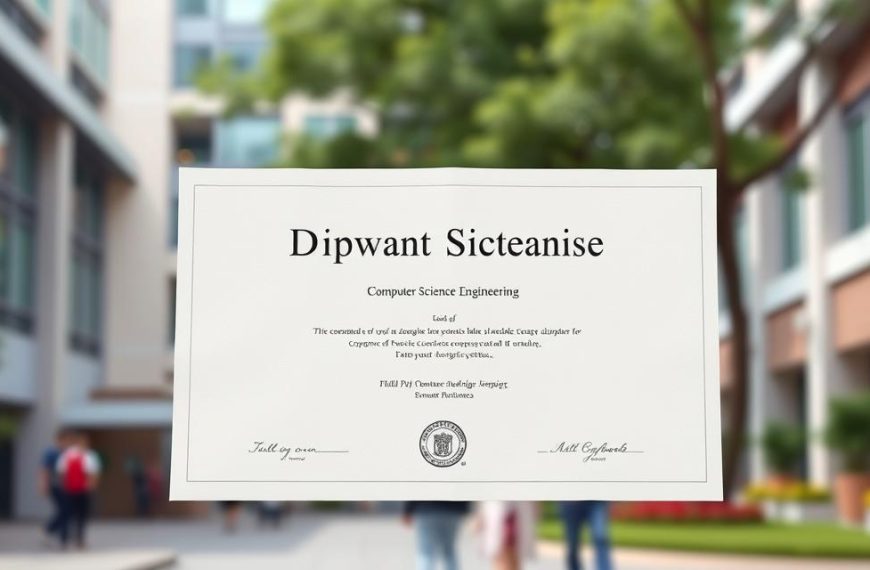The tech industry is rapidly changing, making advanced degrees in computer science a smart career choice. Professionals with specialised knowledge are in high demand in today’s technology landscape.
A master’s in computer science opens doors to exceptional career opportunities. It also significantly boosts earning potential1.
Tech professionals in computer and information technology earn a median annual wage of $104,420. This is more than double the overall median wage of $48,060 across all occupations1.
Graduates with a master’s degree gain access to advanced technical foundations. They explore sophisticated areas like artificial intelligence, cloud computing, and neural networks2.
This advanced degree opens doors to specialised career paths. It positions professionals at the forefront of technological innovation.
A master’s in computer science is more than just an academic achievement. It’s a strategic investment in a dynamic and growing field.
Career Advancement and Salary Potential
A master’s degree in computer science boosts career growth and earning power. Advanced qualifications unlock high-demand tech jobs and significant salary increases. Professionals can access exciting opportunities in the thriving tech industry.
The financial benefits of a master’s degree are substantial. Computer science graduates with advanced degrees earn more. On average, they make £12,688 more annually than bachelor’s degree holders.
Higher Earning Potential in Tech Industry
Technology professionals with a master’s degree enjoy remarkable salary advantages:
- Computer science professionals with a master’s degree earn an average salary of £112,0003
- Entry-level salaries start around £30,000, with experienced professionals reaching £75,000 and above4
- Specialised roles like data science can command salaries exceeding £120,0005
Job Market Growth and Opportunities
The technology sector continues to expand, offering remarkable career growth prospects. Computer science-related jobs are projected to grow by 23% between 2022 and 2032. This growth rate significantly outpaces average occupation growth rates.
Employers increasingly value advanced qualifications in the tech industry. Research shows 24% of computer science employers prefer candidates with master’s degrees. This highlights the competitive advantage gained through postgraduate education.
Investing in a master’s degree is not just an academic pursuit, but a strategic career decision with tangible financial rewards.
Specialised Knowledge and Technical Expertise
A master’s in computer science offers remarkable opportunities to develop advanced skills. Students gain deep technical proficiency through specialisation options. This prepares them for cutting-edge challenges in the digital landscape6.
The programme provides comprehensive learning across multiple critical domains:
- Advanced Security
- Computational Learning Theory
- Geometric Deep Learning
- Quantum Software Development
Specialisation tracks enable students to cultivate targeted technical skills. These align with emerging industry requirements7. Learners can focus on strategic areas such as:
- Machine Learning
- Data Analytics
- Software Engineering
Graduates emerge with sophisticated knowledge that sets them apart in competitive technology markets. The curriculum ensures learners stay current with rapidly evolving technological trends. This equips them to tackle complex computational challenges6.
Technical expertise transforms potential into professional excellence.
Students unlock pathways to innovative career trajectories by embracing specialisation options. These span sectors from healthcare to financial technologies7.
Why Get a Masters in Computer Science
A master’s in computer science offers a strategic path for professionals seeking skill enhancement. It provides transformative opportunities for career progression in the rapidly evolving technology landscape. This advanced degree elevates professional growth and industry relevance.
This advanced academic journey offers significant benefits across multiple career dimensions. The programme provides critical advantages beyond traditional learning experiences.
- Enhanced technical competencies in emerging technologies
- Increased marketability in competitive job markets
- Potential for higher salary brackets8
Professional Development Benefits
A master’s degree in computer science unlocks substantial professional development opportunities. About 33% of employers now hire workers with master’s degrees for positions previously requiring undergraduate qualifications8.
The curriculum focuses on advanced technical foundations. It prepares students to work with cutting-edge technologies like artificial intelligence and cloud computing9.
Industry Recognition
Industry recognition is a critical advantage of obtaining a master’s degree. Nearly 40% of computer science job listings specifically request candidates with master’s degrees8.
This credential signals advanced expertise and commitment to professional growth. It makes graduates more competitive in the technology sector9.
Investing in a master’s degree is not just an academic pursuit, but a strategic career enhancement strategy.
Graduates can anticipate expanded career opportunities in various fields. These include software development, cybersecurity, data science, and leadership positions across multiple industries9.
Computer science master’s degree holders can expect significant salary improvements. They potentially earn over £100,000 annually8.
Investment and Programme Structure
A master’s in computer science requires careful thought about costs and duration. Tuition fees vary widely between institutions and study formats. UK students pay £12,840 to £33,450, depending on their status.
Students can manage their investment through scholarships. These opportunities can greatly reduce financial stress. Here are some available options:
- EU Welcome Award: £5,000 tuition fee discount10
- Postgraduate Access Scholarship: £4,00010
- African Excellence Award: Full tuition fee waiver10
The programme typically requires specific academic prerequisites. These include programming skills in Python, Java, or C++. Students also need 60 SCQF credits in maths.
English language proficiency is crucial. An IELTS score of 7.0 or equivalent is necessary.
- Programming competence in languages like Python, Java, or C++11
- Mathematics background with 60 SCQF credits11
- English language proficiency (IELTS 7.0 or equivalent)11
Investing in a computer science master’s offers substantial long-term career benefits.
The technology sector is booming. Information security analysts expect 35% job growth. Software developers anticipate a 25% increase in opportunities.
Graduates can earn competitive salaries. Computer and information system managers make a median of £159,010 yearly. Students should weigh programme costs against potential salary increases.
Conclusion
A master’s in computer science is a smart career move in the fast-paced tech industry. Graduates can expect better job prospects and higher starting salaries. The tech world values specialised skills that match new trends1213.
Top students from undergraduate programmes may find it easier to get hired. Cutting-edge research and industry links offer valuable networking chances. Graduates can work in software development, AI engineering, and other exciting fields1213.
Programme costs are around £30,000, but the long-term gains often justify the expense. Professionals should think about their career goals and strengths14.
They should also consider their potential for growth in the technological landscape. Choosing advanced education is a personal journey towards success in your field12.
FAQ
What are the key benefits of pursuing a master’s in computer science?
How much can I potentially earn with a master’s degree in computer science?
What specialised skills will I learn during a master’s programme?
How long does a typical master’s in computer science programme take?
What funding options are available for a master’s degree?
Can a master’s degree help me move into leadership roles?
Is an online or in-person programme better?
How current are the curriculum and learning materials?
What career paths can I pursue with a master’s in computer science?
How does a master’s degree differentiate me in the job market?
Source Links
- https://www.coursera.org/articles/is-a-masters-in-computer-science-worth-it
- https://www.edx.org/resources/is-a-masters-degree-in-computer-science-worth-it
- https://graduate.northeastern.edu/knowledge-hub/is-masters-in-computer-science-worth-the-investment/
- https://online.sunderland.ac.uk/careers-in-computer-science-could-a-masters-degree-lead-to-a-better-salary/
- https://technology.online.city.ac.uk/blogs/the-advantages-of-pursuing-a-computer-science-master-s-degree-online/
- https://www.ox.ac.uk/admissions/graduate/courses/msc-advanced-computer-science
- https://www.southampton.ac.uk/courses/computer-science-masters-msc
- https://onlineprograms.case.edu/mscs/blog/do-i-need-a-masters-in-computer-science-11-reasons-why/
- https://www.edx.org/resources/is-a-computer-science-masters-degree-worth-it
- https://www.gla.ac.uk/postgraduate/taught/computingscience/
- https://postgraduate.degrees.ed.ac.uk/?r=site/view&id=110
- https://sumnerevans.com/posts/school/is-getting-a-masters-in-cs-worth-it/
- https://ambitio.club/blog/computer-science-masters-programs/
- https://medium.com/geekculture/should-you-get-a-computer-science-masters-degree-7020547da638















